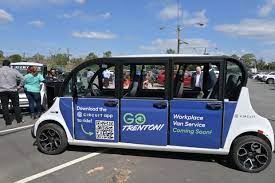eMobility Rolling Grant Program
PURPOSE OF FUNDING
Transportation emissions remain the largest source of greenhouse gas pollution in the State, contributing to climate change impacts like rising temperatures, rising sea levels, and more extreme weather events. They also serve as a significant contributor for other air pollutants, like NOx and particulate matter, which have harmful environmental and health effects. Moving toward transportation electrification addresses these concerns because electric vehicles (EVs) do not produce any tailpipe emissions.
New Jersey’s low-income communities and communities of color have historically been subject to an unreasonably high number of environmental and public health stressors, including transportation emissions. As a result, residents in these areas suffer from increased adverse health effects including, but not limited to, asthma, cancer, elevated blood lead levels, cardiovascular disease, and developmental disorders.
Electric mobility solutions like carshare, rideshare, and ride hailing services provide additional modes of transport for residents in underserved areas, who often don’t own a personal vehicle and rely on public transportation. eMobility will help ensure they have access to and can benefit from the advantages of clean vehicle technology.
APPLICATION
To learn about applying for funding, visit https://njdepwptest.net/drivegreen/emobility-apply-for-funding
APPLICATION DEADLINE
Rolling
NOTIFICATION DATE
TBD
SOURCE OF FUNDING
Various
WHO IS ELIGIBLE
eMobility projects are tailored to the communities they serve. Eligible expenses can include:
- Electric Vehicles and EV charging stations
- Program Development and Operation
- Property purchase or lease (headquarters for vehicles and charging equipment)
- Education and Outreach
- Methods to ensure equity
- Technology (hardware, software, data collection, etc.)
Projects may include one of these project elements or a combination of elements depending on the goal of the program.
QUALIFICATIONS FOR CONSIDERATION
Projects should benefit one or more disadvantaged communities in New Jersey through zero-emission transportation options that:
- Improve mobility and access to jobs, education, healthcare services, and other needs as displayed and/or identified by the community
- Reduce greenhouse gas emissions and other transportation pollutants in and around the community
- Demonstrate meaningful engagement within the community
Shovel ready projects will be prioritized. Applicants with shovel ready projects are those who, for example, have:
- Conducted community surveys to understand the needs of the population to be served
- Formed partnerships needed to advance the project, if awarded
- Shown full comprehension of the scope of work associated with their proposal
- Considered the budgetary needs of the program to ensure it is sustainable
Applicants are encouraged to consider structuring their projects to be scaled and, if appropriate, replicable in other communities. DEP’s funding sources, amounts, and timing can vary. This scalability is useful to help implement the program – whether through a pilot version or an expanded model – depending on the available funding.
GRANT LIMITATIONS
There are no limits to the size of a proposal, but it is beneficial to indicate if a project is scalable with a description of what that means for the overall project.
ADDITIONAL INFORMATION
Funding sources and availability for eMobility varies for each solicitation.
Proceeds from New Jersey’s 2020 Regional Greenhouse Gas Initiative (RGGI) auctions provided approximately $16.2M for eMobility projects. These awards were announced in February 2021, April 2022, and March 2023. View the spending information page here to see how this and other funding was allocated.
GOTrenton! Our Story (gotrenton.org)
FOR MORE INFORMATION, VISIT
NJDEP|Drive Green|eMobility Grant Program
or email stopthesoot@dep.nj.gov

Fact Sheet: